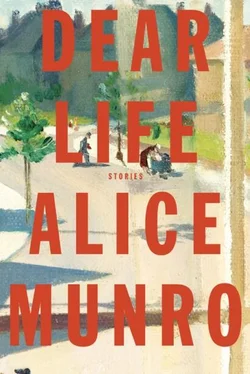Careless warriors, whooping invaders. Drunk up to their eyeballs.
“I’m no piker,” was what they were yelling.
The principal was trying to order them out. But because this was still early in the war and there was as yet some awe and special respect concerning the boys who had signed up, he was not able to show the ruthlessness he would have called upon a year later.
“Now now,” he said.
“I’m no piker,” Billy Watts told him.
Jackson had his mouth open probably to say the same, but at that moment his eyes met the eyes of Ileane Bishop and a certain piece of knowledge passed between them.
Ileane Bishop understood that Jackson was truly drunk but that the effect of this was to enable him to play drunk, therefore the drunkenness displayed could be managed. (Billy Watts was just drunk, through and through.) With this understanding Ileane walked down the stairs, smiling, and accepted a cigarette which she held unlit between her fingers. She linked arms with both heroes and marched them out of the school.
Once outside they lit up their cigarettes.
There was a conflict of opinion about this later, in Ileane’s father’s congregation. Some said Ileane had not actually smoked hers, just pretended, to pacify the boys, while others said she certainly had. Smoked. Their minister’s daughter. Smoked.
Billy did put his arms around Ileane and tried to kiss her, but he stumbled and sat down on the school steps and crowed like a rooster.
Within two years he would be dead.
Meanwhile he had to be got home, and Jackson pulled him so that they could get his arms over their shoulders and drag him along. Fortunately his house was not far from the school. They left him there, passed out on the steps. Then they entered into a conversation.
Jackson did not want to go home. Why not? Because his stepmother was there, he said. He hated his stepmother. Why? No reason.
Ileane knew that his mother had died in a car accident when he was very small—this was sometimes mentioned to account for his shyness. She thought that the drink was probably making him exaggerate, but she didn’t try to make him talk about it any further.
“Okay,” she said. “You can stay at my place.”
It just happened that Ileane’s mother was away, looking after Ileane’s sick grandmother. Ileane was at the time keeping house in a haphazard style for her father and her two younger brothers. This was unfortunate in some opinions. Not that her mother would have made a fuss, but she would have wanted to know the ins and outs, and who was this boy? At the very least she would have made Ileane go to school as usual.
A soldier and a girl, suddenly so close. Where there had been nothing all this time but logarithms and declensions.
Ileane’s father didn’t pay attention to them. He was more interested in the war than some of his parishioners thought a minister should be, and this made him proud to have a soldier in the house. Also he was unhappy not to be able to send his daughter to college. He had to save up to send her brothers there some day, they would have to earn a living. That made him go easy on Ileane whatever she did.
Jackson and Ileane didn’t go to the movies. They didn’t go to the dance hall. They went for walks, in any weather and often after dark. Sometimes they went into the restaurant and drank coffee, but did not try to be friendly to anybody. What was the matter with them, were they falling in love? When they were walking they might brush hands, and he made himself get used to that. Then when she changed the accidental to the deliberate, he found that he could get used to that also, overcoming a slight dismay.
He grew calmer, and was even prepared for kissing.
Ileane went by herself to Jackson’s house to collect his bag. His stepmother showed her bright false teeth and tried to look as if she was ready for some fun.
She asked what they were up to.
“You better watch that stuff,” she said.
She had a reputation for being a loudmouth. A dirty mouth, actually.
“Ask him if he remembers I used to wash his bottom,” she said.
Ileane, reporting this, said that she herself had been especially courteous, even snooty, because she could not stand the woman.
But Jackson went red, cornered and desperate, the way he used to when asked a question in school.
“I shouldn’t even have mentioned her,” Ileane said. “You get in the habit of caricaturing people, living in a parsonage.”
He said it was okay.
That time turned out to be Jackson’s last leave. They wrote to each other. Ileane wrote about finishing her typing and shorthand and getting a job in the office of the Town Clerk. She was determinedly satirical about everything, more than she had been in school. Maybe she thought that someone at war needed joking. And she insisted on being in the know. When hurry-up marriages had to be arranged through the clerk’s office, she would refer to the Virgin Bride.
And when she mentioned some minister visiting the parsonage and sleeping in the spare room, she said she wondered if the mattress would induce Peculiar Dreams.
He wrote about the crowds on the Île de France and the ducking around to avoid U-boats. When he got to England he bought a bicycle and he told her about places he had biked around to see, if they were not out of bounds.
These letters though more prosaic than hers were always signed “With Love.” When D-day did come there was what she called an agonizing silence but she understood the reason for it, and when he wrote again all was well, though details were not permitted.
In this letter he spoke as she had been doing, about marriage.
And at last VE-day and the voyage home. There were showers of summer stars, he said, all overhead.
Ileane had learned to sew. She was making a new summer dress in honor of his homecoming, a dress of lime-green rayon silk with a full skirt and cap sleeves, worn with a narrow belt of gold imitation leather. She meant to wind a ribbon of the same green material around the crown of her summer hat.
“All this is being described to you so you will notice me and know it’s me and not go running off with some other beautiful woman who happens to be at the train station.”
He mailed his letter to her from Halifax, telling her that he would be on the evening train on Saturday. He said that he remembered her very well and there was no danger of getting her mixed up with another woman even if the train station happened to be swarming with them that evening.
On their last evening before he left, they had sat up late in the parsonage kitchen where there was the picture of King George VI you saw everywhere that year. And the words beneath it.
And I said to the man who stood at the gate of the year, “Give me a light that I may tread safely into the unknown.”
And he replied, “Go out into the darkness and put your hand into the hand of God. That shall be to you better than light and safer than a known way.”
Then they went upstairs very quietly and he went to bed in the spare room. Her coming to him must have been by mutual agreement but perhaps he had not quite understood what for.
It was a disaster. But by the way she behaved, she might not even have known that. The more disaster, the more frantically she carried on. There was no way he could stop her trying, or explain. Was it possible a girl could know so little? They parted finally as if all had gone well. And the next morning said good-bye in the presence of her father and brothers. In a short while the letters began.
He got drunk and tried once more, in Southampton. But the woman said, “That’s enough, sonny boy, you’re down and out.”
A thing he didn’t like was women or girls dressing up. Gloves, hats, swishy skirts, all some demand and bother about it. But how could she know that? Lime green. He wasn’t sure he knew the color. It sounded like acid.
Читать дальше












